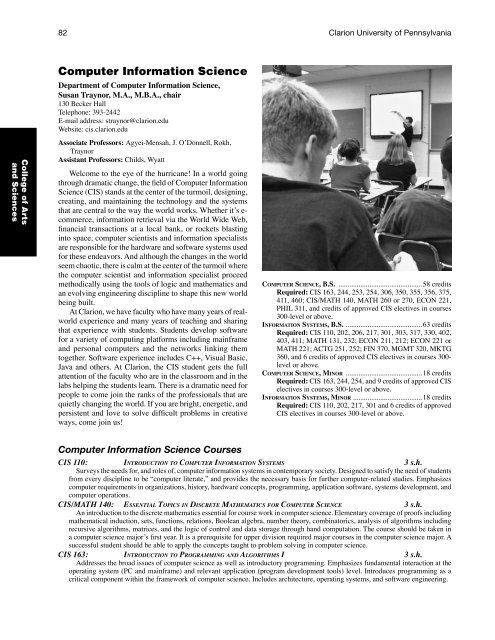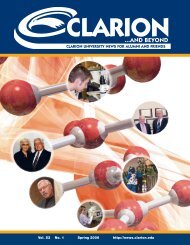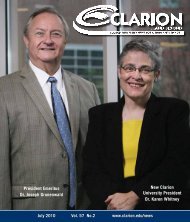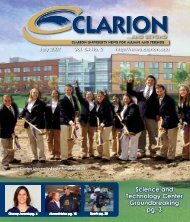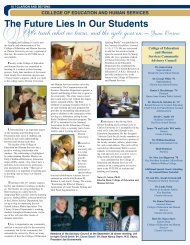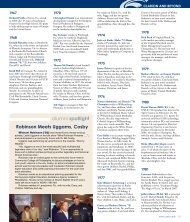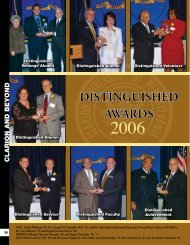pages i-viii82 <strong>Clarion</strong> <strong>University</strong> of PennsylvaniaComputer Information ScienceDepartment of Computer Information Science,Susan Traynor, M.A., M.B.A., chair130 Becker HallTelephone: 393-2442E-mail address: straynor@clarion.eduWebsite: cis.clarion.eduCollege of Artsand SciencesAssociate Professors: Agyei-Mensah, J. O’Donnell, Rokh,TraynorAssistant Professors: Childs, WyattWelcome to the eye of the hurricane! In a world goingthrough dramatic change, the field of Computer InformationScience (CIS) stands at the center of the turmoil, designing,creating, and maintaining the technology and the systemsthat are central to the way the world works. Whether it’s e-commerce, information retrieval via the World Wide Web,financial transactions at a local bank, or rockets blastinginto space, computer scientists and information specialistsare responsible for the hardware and software systems usedfor these endeavors. And although the changes in the worldseem chaotic, there is calm at the center of the turmoil wherethe computer scientist and information specialist proceedmethodically using the tools of logic and mathematics andan evolving engineering discipline to shape this new worldbeing built.At <strong>Clarion</strong>, we have faculty who have many years of realworldexperience and many years of teaching and sharingthat experience with students. Students develop softwarefor a variety of computing platforms including mainframeand personal computers and the networks linking themtogether. Software experience includes C++, Visual Basic,Java and others. At <strong>Clarion</strong>, the CIS student gets the fullattention of the faculty who are in the classroom and in thelabs helping the students learn. There is a dramatic need forpeople to come join the ranks of the professionals that arequietly changing the world. If you are bright, energetic, andpersistent and love to solve difficult problems in creativeways, come join us!Computer Science, B.S. ...............................................58 creditsRequired: CIS 163, 244, 253, 254, 306, 350, 355, 356, 375,411, 460; CIS/MATH 140, MATH 260 or 270, ECON 221,PHIL 311, and credits of approved CIS electives in courses300-level or above.Information Systems, B.S. ..........................................63 creditsRequired: CIS 110, 202, 206, 217, 301, 303, 317, 330, 402,403, 411; MATH 131, 232; ECON 211, 212; ECON 221 orMATH 221; ACTG 251, 252; FIN 370, MGMT 320, MKTG360, and 6 credits of approved CIS electives in courses 300-level or above.Computer Science, Minor ...........................................18 creditsRequired: CIS 163, 244, 254, and 9 credits of approved CISelectives in courses 300-level or above.Information Systems, Minor ......................................18 creditsRequired: CIS 110, 202, 217, 301 and 6 credits of approvedCIS electives in courses 300-level or above.Computer Information Science CoursesCIS 110: Introduction to Computer Information Systems 3 s.h.Surveys the needs for, and roles of, computer information systems in contemporary society. Designed to satisfy the need of studentsfrom every discipline to be “computer literate,” and provides the necessary basis for further computer-related studies. Emphasizescomputer requirements in organizations, history, hardware concepts, programming, application software, systems development, andcomputer operations.CIS/MATH 140: Essential Topics in Discrete Mathematics for Computer Science 3 s.h.An introduction to the discrete mathematics essential for course work in computer science. Elementary coverage of proofs includingmathematical induction, sets, functions, relations, Boolean algebra, number theory, combinatorics, analysis of algorithms includingrecursive algorithms, matrices, and the logic of control and data storage through hand computation. The course should be taken ina computer science major’s first year. It is a prerequisite for upper division required major courses in the computer science major. Asuccessful student should be able to apply the concepts taught to problem solving in computer science.CIS 163: Introduction to Programming and Algorithms I 3 s.h.Addresses the broad issues of computer science as well as introductory programming. Emphasizes fundamental interaction at theoperating system (PC and mainframe) and relevant application (program development tools) level. Introduces programming as acritical component within the framework of computer science. Includes architecture, operating systems, and software engineering.
<strong>Clarion</strong> <strong>University</strong> of Pennsylvania 83CIS 202: Introduction to Event-Driven Programming 3 s.h.Introduces graphical user interfaces, event-driven programming, and windows on-screen objects such as command buttons, textboxes, option buttons, and forms. Programming projects will require students to design interactive screens as well as code subroutinesto implement the programs.CIS 206: Introduction to Java Programming 3 s.h.Introduces the Java programming language. Designed to expose information systems majors to a second programming language(after Visual Basic). Involves programming Java applets and Java applications. Students learn the core of the language including itsdata types, arithmetic statements, selection statements, repition statements, arrays, and string processing features. Object-orientedprogramming concepts are introduced but are not the focus of the course. Other topics include Java’s windowing toolkits, file inputand output, exception handling, and the Java security model. Prerequisite: CIS 202. Not for credit for CS majors.CIS 217: Applications of Microcomputers 3. s.h.Introduces the basic concepts of microcomputers and software applications. Includes commonly available software packages andgraphics. No prerequisite.CIS 230: Practicum in Computer Information Science 1-2 s.h.Provides undergraduate students with an introduction to the role of computer specialists in the everyday operation of a computerlaboratory. Supplies real experience in such routine exercises as interacting with computer users to field problems and complaints,machine event logging, and performing simple tasks to keep machines operating. A maximum of six credits of the practicum may beapplied toward graduation. Prerequisite: CIS 217 or permission of the instructor.CIS 244: Introduction to Programming and Algorithms II 3 s.h.Examines complex problem-solving techniques, top down design, and program debugging and testing. Prerequisite: CIS 163.CIS 253: Computer Organization and Assembly Language 3 s.h.Consists of two major parts: (1) an introduction to assembly language programming and (2) an introduction to computer organizationand the structuring of major hardware components. Students develop a basic understanding of the mechanics of information transferand control and the fundamentals of logic design. Prerequisite: CIS 163 or 202.CIS 254: Data Structures 3 s.h.Introduces the structuring of data in computer programs. Topics include static, dynamic, and persistent memory, linked lists, stacks,queues, trees, and hash tables. The major concepts are reinforced through programming assignments using algorithms illustrating thepower of each data structure. Prerequisite: CIS 244.CIS 301: Computer Systems Analysis 3 s.h.Study of informational needs and patterns of information flow within a large organization. Emphasizes the analysis and design ofcomputer software systems. Examines ethical and legal issues related to information systems. Prerequisites: CIS 217 and 202 or 244.CIS 303: Local Area Networks 3 s.h.Study of the technology of local area networks. Includes LAN design, topology, hardware, standards, protocols, and networkoperating systems. Includes significant hands-on experience building a LAN and installing network interface cards and cable.Prerequisite: CIS 163 or CIS 202.CIS 304: Internet Programming 3 s.h.A review of the Internet and the World Wide Web practices and protocols. Evaluations of methods, development tools, services,standards, administration, and trends used in providing information over the Internet. Includes hands-on development with evolvingInternet technologies such as Dynamic HTML, Cascading Style Sheets, client-side scripting, server-side scripting, Web ServerAdministration, Perl/CGI, Java/JSP, PHP, ASP, XML, and/or Web Services. Prerequisite: CIS 163 or 202.CIS 305: Artificial Intelligence in Decision-Making 3 s.h.Surveys the thinking and some of the pioneering efforts in the area of artificial intelligence (AI), integrated with more traditionalapproaches to decision-making. Applies AI principles through the use of logic programming languages. Prerequisite: CIS 163 or 202.CIS 306: Object–Oriented Programming 3 s.h.Introduces a popular object-oriented programming language. Emphasizes object-oriented features of the language: classes andobjects, encapsulation, inheritance, and virtual functions. Exposes students to both the syntax and semantics of the language. Applyingthese features, students complete several small programming projects. Smalltalk and Java are examples of languages that might bechosen. Prerequisite: CIS 206 or 244.CIS 312: Special Topics in Computing 3 s.h.Provides for focused study of a special interest topic in computing using learning formats selected by the instructor as best suitedfor the particular course. Prerequisites for particular course set by the instructor.CIS 317: Microcomputer Maintenance Concepts and Techniques 3 s.h.Covers the installation, configuration, upgrading, troubleshooting and repair of microcomputer hardware. Includes basic networkingconcepts and printers. Knowledge of safety and common preventive maintenance procedures is stressed. Prerequisite: CIS 217.CIS 330: Advanced Event-Driven Programming 3 s.h.In-depth study of event-driven programming with a concentration on the retrieval, updating, and reporting of information storedin a database. Prerequisite: CIS 202.CIS 333: Information Systems Auditing and Security 3 s.h.Analyzes the information system audit process, provision and evaluation of controls in all aspects of information system operation, andthe provision and maintenance of computer security. Stresses internal controls while examining specific controls and security. Prerequisite:CIS 303.pages i-viiCollege of Artsand Sciences


